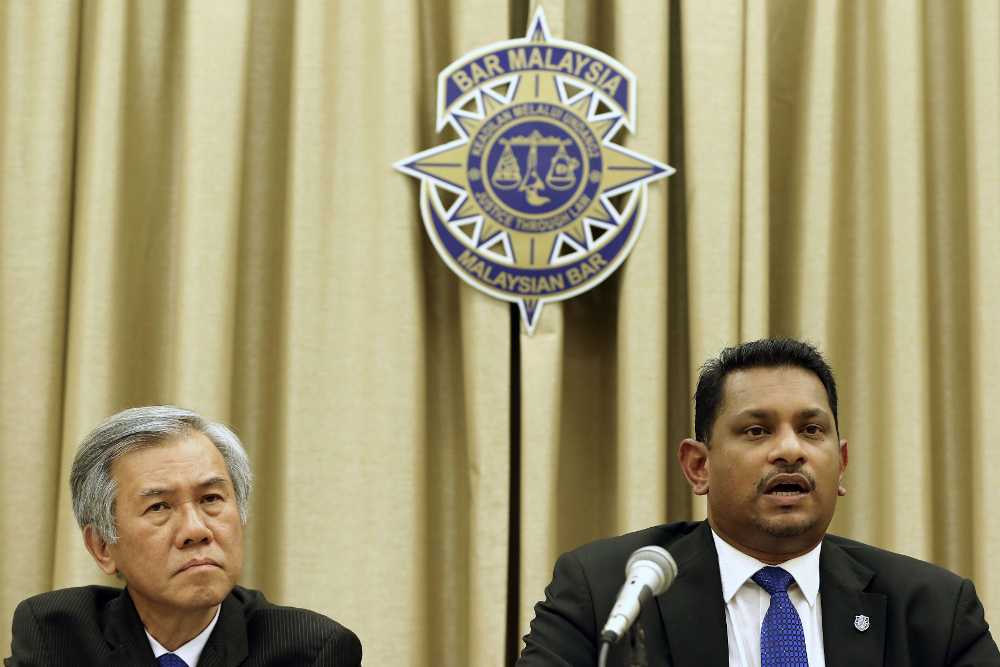KUALA LUMPUR, March 16 — The Malaysian Bar today passed five resolutions at its annual general meeting (AGM), including a resolution calling for the government to immediately set up a royal commission of inquiry (RCI) on allegations of judicial interference.
The Malaysian Bar also voted on a separate resolution to have the RCI also look into how cases are distributed for hearing before panels of judges at the Court of Appeal and Federal Court level.
This resolution was made with the goal of promoting transparency on the workings of the appellate court and to introduce reforms if necessary.
“The Malaysian Bar respectfully calls upon the Yang di-Pertuan Agong when setting up the Royal Commission of Inquiry inquiring into the workings of the judiciary to include as a term of reference that the RCI do inquire into how the appellate court judges who sit in panels comprising more than one are assigned and allocated cases and whether the current system requires any revision,” the resolution said.
The resolution had observed that it was allegedly “not uncommon” for the appellate courts to dismiss appeals without hearing them on merits due to certain documents being left out in the appeal records compiled by those involved in the lawsuits.
It also raised the question of whether judges have sufficient time to read all the lengthy court documents, in situations where panels of judges have to hear multiple appeals in one sitting or when such panels are formed on short notice.
As for the resolution calling for the RCI to be immediately set up, it also called on the Bar Council to send a lawyer to hold a watching brief on behalf of the Malaysian Bar in the RCI proceedings and to assist the RCI.
This resolution had pointed out the “extremely serious and shocking allegations” by Court of Appeal judge Datuk Hamid Sultan Abu Backer regarding the judiciary, including in relation to a sedition case involving the late Karpal Singh.
Hamid Sultan had alleged that a Court of Appeal panel had initially arrived at a decision to allow Karpal's appeal and acquit him, but claimed that a top judge purportedly directed the panel to dismiss the appeal and which resulted in Karpal's conviction being affirmed.
The government had recently announced its decision to form the RCI, but it has not been set up yet.
Another resolution which was approved by members is for the Malaysian Bar to call upon Putrajaya to publicly release the Institutional Reforms Committee's final report to enable Malaysians to “hold the federal government accountable for its promises”, as well as to call the government to immediately act on institutional reforms especially for key institutions such as the judiciary, parliament, Election Commission, the Attorney General’s Office, the police and the Malaysian Anti-Corruption Commission.
The two remaining resolutions that were passed were similar in nature, with both calling for the Pakatan Harapan government to immediately abolish draconian laws as it had promised in its manifesto for the 14th general elections.
One of these resolutions urged for the speedy abolition of these laws without further delay and for a freeze on the use of these laws until they are scrapped, while the other resolution noted the government has been “procrastinating” on the promised repeals.
When asked what the Bar Council would do to fulfill its mandate in the resolutions to pursue the items voted for, the newly-elected Malaysian Bar president Datuk Abdul Fareed Abdul Gafoor said the Bar Council would engage with the government and expects to write in to the government next week.
Abdul Fareed said three of the proposed resolutions were withdrawn today, including a motion on the abolition of the death penalty owing to a need for further study on the matter.
“The reason why is because a lot of studies have been made in various jurisdictions, study report that it is not effective to deter crime, so the house decided to defer this maybe sometime later. The proposer actually withdrew the motion,” he explained.
He also reiterated the Malaysian Bar's stand to completely remove the death sentence as he weighed in on the government's decision to retain the death penalty as an option at the discretion of judges.
“The Malaysian Bar's stand for the longest time was for a total abolition of the death penalty, so this proposal by the government is slightly short of what we have requested for.
“But I would certainly say it's a step in the right direction, so at least there will be some discretion now. Maybe from there, in time to come, there will be total abolition. We are hoping for that as well,” he said.
One of the nine proposed resolutions was put to the vote and not carried through, but Abdul Fareed did not disclose which resolution this was.
A total of 835 members were present at the Malaysian Bar's 73rd annual general meeting, which is a closed-door event.
The Malaysian Bar has 18,445 members as of February 18, with 500 members being sufficient for a quorum at today's AGM.




















